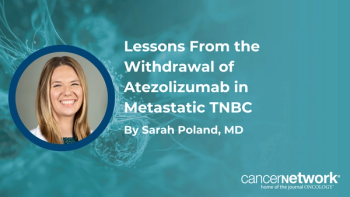
- ONCOLOGY Vol 22 No 6
- Volume 22
- Issue 6
Novel Capecitabine Dosing May Offer Well-Tolerated Alternative for Treating Advanced Breast Cancer
A novel biweekly dosing schedule of capecitabine (Xeloda) enabled safe delivery of higher daily doses in the treatment of advanced breast cancer, according to an investigational study published in the Journal of Clinical Oncology.
A novel biweekly dosing schedule of capecitabine (Xeloda) enabled safe delivery of higher daily doses in the treatment of advanced breast cancer, according to an investigational study published in the Journal of Clinical Oncology. The data showed that a dose-dense 7-days-on/7-days-off regimen was generally well-tolerated at up to 2,000 mg twice daily (4,000 mg/d), providing a potential alternative to the standard capecitabine dosing of 14 days on and 7 days off.
“As we predicted using the Norton-Simon mathematical model-the basis for the dose-dense approach to therapy that was pioneered at Memorial Sloan-Kettering Cancer Center (MSKCC)-these results demonstrate that a biweekly regimen of capecitabine appears to be well-tolerated, at dosing levels that are higher than previously thought possible,” said Tiffany A. Traina, MD, a medical oncologist in the breast cancer medicine service at MSKCC in New York and lead author of the study. “We’re currently conducting later-phase trials to determine the efficacy of this 7-on/7-off dosing schedule.”
Efficacy of the 7-on/7-off schedule using capecitabine is being determined in a phase II clinical trial program in patients with advanced breast cancer and is also being tested in combination with bevacizumab (Avastin).
About the Study
Prior to study initiation, the Norton-Simon mathematical model, which explores how the growth characteristics of a cancer affect response to chemotherapy, was applied to determine that the maximum impact of capecitabine treatment in breast cancer patients occurs after 7 days. Based on this finding, the single-center, open-label phase I/II trial was designed to determine the maximum tolerated dose (MTD) of capecitabine administered orally for 7 days, followed by a 7-day rest, in patients with advanced-stage breast cancer. MTD was defined as the highest dose for which the incidence of dose-limiting toxicity (DLT) is less than 33%. DLT was defined as grade 3/4 hematologic toxicity lasting greater than 2 weeks despite growth factor support, or any grade 3/4 nonhematologic toxicity.
The study showed that the dose-dense regimen was well-tolerated in patients with advanced breast cancer, allowing safe delivery of higher daily doses than routinely used in practice. Of the 21 patients recruited for the trial, 18 were treated with capecitabine and reached a maximum tolerated dose of 2,000 mg twice daily. There were no grade 4/5 toxicities, and grade 3 toxicities were transient and medically manageable. The most frequently reported treatment-related grade 2/3 adverse events were hand-foot syndrome (29%), leukopenia/neutropenia (24%), and fatigue (19%).
Articles in this issue
almost 18 years ago
Professionalism and Cancer Carealmost 18 years ago
Martin Abeloff and the Quality-of-Life Movementalmost 18 years ago
Tracking 35 Years of Progress Against Breast Canceralmost 18 years ago
Remembering Martin D. Abeloff, MDalmost 18 years ago
Psychological and Social Aspects of Breast Canceralmost 18 years ago
The Importance of Communication in Treating Women With Breast Canceralmost 18 years ago
Making Strides in Adjuvant Therapy for Breast CancerNewsletter
Stay up to date on recent advances in the multidisciplinary approach to cancer.
Related Content


Molecular Interception: Discussing the Future of Surgery in Breast Cancer

Lessons From the Withdrawal of Atezolizumab in Metastatic TNBC


















































